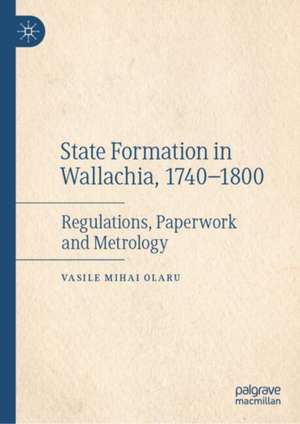State Formation in Wallachia, 1740-1800: Regulations, Paperwork, and Metrology
Autor Vasile Mihai Olaruen Limba Engleză Hardback – 24 sep 2024
Preț: 787.29 lei
Preț vechi: 960.11 lei
-18% Nou
Puncte Express: 1181
Preț estimativ în valută:
150.67€ • 163.60$ • 126.56£
150.67€ • 163.60$ • 126.56£
Carte tipărită la comandă
Livrare economică 23 aprilie-07 mai
Preluare comenzi: 021 569.72.76
Specificații
ISBN-13: 9783031596254
ISBN-10: 3031596250
Pagini: 330
Ilustrații: Approx. 330 p.
Dimensiuni: 148 x 210 mm
Greutate: 0.59 kg
Ediția:2024
Editura: Springer Nature Switzerland
Colecția Palgrave Macmillan
Locul publicării:Cham, Switzerland
ISBN-10: 3031596250
Pagini: 330
Ilustrații: Approx. 330 p.
Dimensiuni: 148 x 210 mm
Greutate: 0.59 kg
Ediția:2024
Editura: Springer Nature Switzerland
Colecția Palgrave Macmillan
Locul publicării:Cham, Switzerland
Cuprins
- Introduction.- 2. Wallachia in the Early Modern Period and Transformation in the Eighteenth Century.- 3. From Local Custom to Written Law: Agrarian Regulations and State Infrastructural Growth.- 4. From Private Charter to Stature: The Fiscal Regulations.- 5. Paperwork: Immobile Instruments for Storing Information.- 6. Mobile Instruments for Storing Information.- 7. The Standardization of Weights and Measures.- 8. Conclusions.
Notă biografică
Vasile Mihai Olaru is a researcher at the “George Bariţiu” Institute of History of the Romanian Academy, Romania. His research interests include early modern history, state formation, the history of corruption, and historiography. Previously, he studied at Central European University in Budapest, where he received his PhD.
Textul de pe ultima copertă
This book explores the transformation of the state in Wallachia, an Ottoman tributary principality, between 1740 and 1800 by focusing on three administrative techniques: regulations, paperwork (registers, identification certificates), and weights and measures. The implementation by the central power of regulations, bookkeeping, certificates, and standard units of measurement was not smooth, but it nevertheless heralded the beginning of the struggle against localism and the efforts to extend the boundaries of legitimate state action. The author challenges the (mostly Romanian) historiography of the Phanariot period, which has portrayed the state as a set of institutions undertaking certain responsibilities and has insisted almost exclusively on its extractive function and abusive character. Instead, this book takes a closer look at how the Wallachian state functioned, examining how its means of interacting with its subjects changed in the second half of the eighteenth century. Rethinking the problem of the state in eighteenth-century Wallachia, traditionally regarded as a mere instrument of Ottoman domination, it claims that it was precisely during this time that the bases of modern statehood were laid in a context defined by imperial rivalries (Ottoman, Habsburg, Russian) in the region. Making the case for state formation in the absence of preparation for war, the author also stresses, in contrast to recent contributions that decentre the state, the need to study the process whereby the effect of state coherence is produced. While focusing on Wallachia, this book provides valuable reading for those interested in early modern administrative and legal history, the history of state formation, and Southeast European history more generally.
Vasile Mihai Olaru is a researcher at the “George Bariţiu” Institute of History of the Romanian Academy, Romania. His research interests include early modern history, state formation, the history of corruption, and historiography. Previously, he studied at Central European University in Budapest, where he received his PhD.
Vasile Mihai Olaru is a researcher at the “George Bariţiu” Institute of History of the Romanian Academy, Romania. His research interests include early modern history, state formation, the history of corruption, and historiography. Previously, he studied at Central European University in Budapest, where he received his PhD.
Caracteristici
Examines the formation and transformation of the state, Wallachia, in the early modern period Focuses on three administrative techniques: regulations, paperwork, and weights and measures Draws from a range of administrative and judicial sources
